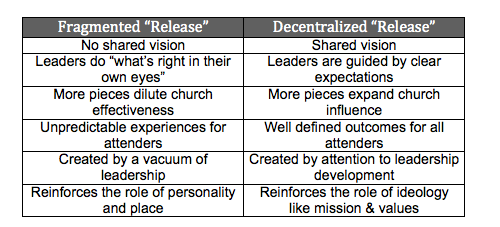
Good church leaders know the importance of releasing and sending people to do ministry. Jesus himself moved quickly from modeling ministry for twelve leaders, to sending out those same twelve to do ministry on their own (Luke 9:1).
Yet in observing hundreds of churches from coast to coast, not all "releasing" is the same. In fact, there is a good kind and a bad kind. And if you don't the difference, your ministry will be limited for the rest of your life.
Let's say a pastor is consistently recruiting volunteers to initiate and lead in multiple environments like groups, classes, and teams. And let's say he has just recruited ten new small group leaders. In the next week, let's imagine these ten leaders will be facilitating some kind of learning and relationship building in homes for the sake of Jesus— a common snapshot of small group life in the American church.
What will actually happen in those homes?
In this scenario the most common kind of "releasing" is fragmentation. That is, we are not just splitting up and breaking into "smaller chunks of people" with regard to ministry time and place, we are also dividing and breaking apart the shared intent within each time and place.
The biblical and effective way to "release" is not fragmentation but decentralization. That is, taking some centrally defined intent and executing them without a central person or place defining the experience.

Most ministry activity is fragmented not decentralized because there simply no clarity of shared intent, no cultivation of shared values, and no development of shared abilities within the church. In short, their is no shared vision, just many little mini-visions everywhere a 'piece' of the ministry gathers.
The few ministries that operate a decentralized ministry have gone to great lengths to build a well defined vision first. Something other than a central pastor or central church building define the what, why and how of reality where ever groups, classes or events meet. That something always brings shared meaning in the form of ideals, goals, dreams, tools, approaches, stories, etc.
To illustrate, Alcoholics Anonymous is a decentralized organization. This successful program happens with no central person or place to guide it. But there is a central methodology—12-steps—with a defined set of values and practices that guide the experience of de-centralized communities.
What central methodology guides the experiences of your classes or groups or teams? Is your ministry fragmented or decentralized?
It is tempting to try to explain these concepts with metaphors like "the starfish and the spider" or apples and oranges. There are several quick and dirty metaphors out there. But based on your unique church context those metaphors may or may not work. That's why I am working on a better metaphor or illustration for another post. I would love to hear your ideas if any come to mind.
